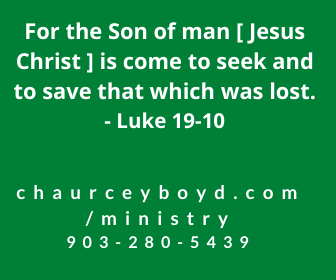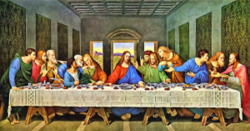The topic to which I speak is that of Easter; only a summary of considerations is provided here. The Holy Scriptures speak to this issue. However, some explanatory guidance is essential concerning the application of the scriptures in our modern day society.
Colossians 2:16-22 says “Let no man therefore judge you in meat, or in drink, or in respect of an holyday, or of the new moon, or of the sabbath days: Which are a shadow of things to come….”
Christian holidays are considered by Christians to be special holydays. So let no one judge you as to their validity if they are intended to honor and glorify God as long as you do not violate any biblical sound doctrinal principles.
There are two Passovers defined in scriptures. The first is the Jewish Passover or Mosaic Passover celebration or holiday or holyday as instituted under the Old Covenant as described in scriptures like Exodus 12:13-14, 24 and Numbers 9:1-5. The second is the Christian Passover as instituted under the New Covenant as described in scriptures like 1 Cor 5:7-8 where Christ is described as the Passover (lamb, bread, blood) under the New Covenant.
Biblically, Easter in terms of paralleling the Mosaic Passover does not necessarily do so in terms of the number of days of the Mosaic Passover and Feast of Unleavened Bread, an eight-day period, since the time from Christ crucifixion to his resurrection is certainly not eight days according to the biblical record.
The Mosaic Passover is applicable to all biological Israelites and non-Israelites who desire to join in the Mosaic Passover memorialization. However, Easter is only applicable to those persons, Israelite and non-Israelite, who are disciples of Christ.
Biblically, Easter in terms of paralleling the Mosaic Passover does not necessarily do so in terms of the number of days of the Mosaic Passover since the time from Christ crucifixion to his resurrection is certainly not seven days according to the biblical record. So for me no matter the rightness or wrongness or ill-advisedness of the Acts 12:4 translation as Easter, in modern times usage of the word it is sufficient to say Easter Sunday (or shortened form Easter) is that day when we celebrate in a special way Christ as our Passover with respect to his crucifixion (Lamb slain) and resurrection (giving us hope for freedom from earthly bondage).
In most places in the KJV the Greek Word Pascha (G3957) is translated Passover in reference to the Mosaic Passover; the exception is in Acts 12:4 where the Greek Word Pascha (G3957) is translated Easter. The New King James Version (NKJV) does use the word Passover instead of Easter.
It is unclear why the KJV translator(s) chose to translate the word as Easter in Acts 12:4. Perhaps it is a function of the Easter or Passover Controversy that existed in the early church. This controversy is outlined in my article entitled Easter or Passover Controversy.
Though I believe the word in Acts 12:4 should be Passover instead of Easter, let me discuss some possibilities as to why KJV has the translation of the word to Easter instead of Passover in Acts 12:4.
If they did so to only represent the Acts 12:4 Passover celebration as the Christian Passover, then that in my view would have been an erroneous translation. This is because Acts 12:3 clearly indicates the original writer, Luke, was referring to the Mosaic Passover in his use of the phrase unleavened bread. So it is doubtful the translator used the word Easter in that way.
Acts 12:4 is the only place where the Greek word for Passover occurs in the book of Acts. So perhaps the translator of Acts considered the words Easter and Passover to be synonymous at the time of translation.
The translation using the word Easter is likely done as a merger of the Mosaic Passover and the Christian Passover such that Christ as the Christian Passover being superior to the Mosaic Passover. In fact, Paul in 1 Cor 5:7-8 perhaps indicates such a merger and certainly the superiority of Christ as our Passover in contrast to the Mosaic Passover.
The Mosaic Passover was perhaps included as a part of the Acts 12:4 celebration as it is still good even for Gentiles to remember the Israelites deliverance from Egypt. Indeed, one would expect the Jewish apostles and other Jewish disciples to celebrate the Mosaic Passover as it was part of their heritage much like Americans celebrate Independence Day and American Blacks celebrate abolishment of slavery in America.
One would expect the Jewish and Gentile disciples including the apostles like Peter and Paul to have remembered, honored, and celebrated Christ as the Christian Passover superior to the Mosaic Passover. Yet, since they were Jews they most likely also celebrated the Mosaic Passover. Hence once again, translating the word as Passover instead of Easer would have been okay to do and consistent with the rest of translation.
So then even if the Acts 12:4 celebration was in fact the Mosaic Passover celebration not intended to also honor Christ, it may be a historical error to translate using the word Easter. Yet, it is not a spiritual or doctrinal error since the celebrating Christians would certainly also be remembering Christ as their Passover also.
Moreover, we should observe that the book of Acts is primarily about the Christian Church not the Jews as the nation of Israel. So then even if the Acts 12:4 celebration was in fact the Mosaic Passover and Christian Passover celebration, it is not a spiritual or historical error to use the word Easter to mark this celebration as more than just a Mosaic Passover celebration. Again, this is because the celebrating Christians would certainly also be remembering Christ as their Passover in addition to the Mosaic Passover.
Nevertheless, it is likely that the disciples celebrated both the Mosaic Passover and Christian Passover during the time frame mentioned in Acts 12:4. Indeed, even now the Mosaic Passover and the Easter celebration approximate each other in time frame and often overlap to some degree. So then the use of the word Easter was a translator’s preference to distinguish the celebration from a Mosaic Passover celebration only and does not introduce any spiritual/doctrinal or historical error into the translation text.
In any case I think it would have been better and certainly consistent with the rest of translation to have translated the word as Passover even in Acts 12:4 instead of as Easter and instead of being one of those rare places where the translators interpret.
See “Easter” Is Not A Mistranslation or Isn’t “Easter” in Acts 12:4 a mistranslation? for justification for use of the word Easter in Acts 12:4.
The above documents note that the Mosaic Passover is a single night meal that precedes the days of unleavened bread mentioned in Acts 12:4. So then the period of time referred to in Acts 12:4 as Easter
occurs after the Mosaic Passover and is therefore not the same as the Mosaic Passover.
See my article entitled Easter or Passover Controversy. for information on the relationship between Easter and the Mosaic Passover the early church wrestled with.
See my article entitled The Words Easter and Passover – Etymology.
See my article entitled Celebration of Easter for more information on the validity and meaning of the Christian Holiday Easter.
Reference:
Easter or Passover in Acts 12!
Is Passover Pagan? – an interesting talk that says Passover incorporates practices and concepts that existed prior to formation of Israel as a nation. The idea is that God used pagan practices to demonstrate he is the true God. So Passover is not Pagan because its focus is on the one true God but some of its elements has pagan roots.


